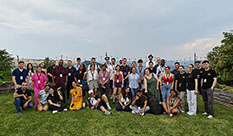More:
News & Stories
Preventing Future Pandemics: Hope on the Horizon?
New digital approach for integrating human, animal and environmental ecosystems was conceived by scientists from HIT and European institutions, helping to create an effective unified framework.
Dr. Arriel Benis: "In the future, the One Digital Health (ODH) approach can be used to prevent and manage health crises like the COVID-19 pandemic."

Dr. Arriel Benis from the Faculty of Industrial Engineering and Management and the Digital Medical Technologies program at HIT, collaborated with other experts from the Universities of Naples (Italy) and Oslo (Norway) and the HL7 Europe (Health Level 7 Foundation)* , to formulate a novel integrated approach to the management of health ecosystems. They published this framework in JMIR – Journal of Medical Internet Research**.
Bringing together two keys - the classical systemic umbrella concept of One Health*** and the rapidly growing technology-based field of Digital Health - the proposed approach has been named One Digital Health (ODH). According to its developers, ODH Integrates the health of humans, animals, plants and the environment and their mutual interactions, while using advanced technology as a catalyst to facilitate and improve collaboration among practitioners in all relevant professional communities, for the benefit of global health.
The novel ODH concept approaches the issue of health ecosystems from three complementary perspectives: individual health and wellbeing of humans and animals; populations and societies; and the ecosystem. It also defines five dimensions to be monitored and/or conducted with modern technological means: human and veterinary healthcare; the environment; the healthcare industry; education; and citizen engagement. All keys, perspectives and dimensions can intersect and interact with one another within the overall framework, integrating data from many different sources - to provide all involved parties with a comprehensive, data-driven, near-real-time picture and effective science-based tools for enhanced health management.
Ultimately, according to Dr. Benis, the forward-looking approach aims to digitally transform future health ecosystems, targeting and involving each and every one of us: from physicians, healthcare professionals and veterinary practitioners who implement cutting-edge present and future digital technologies such as medical robotics and telemedicine; through academic researchers studying diseases like cancer, environmental experts, the healthcare industry and government agencies monitoring the health ecosystem at every level; to educators, students and involved citizens who snap photos and report relevant events on the social media.
"In the future, the integrative ODH approach can be used to prevent and manage health crises like the COVID-19 pandemic," says Dr. Benis. "In fact, the current pandemic is only one of several recent zoonotic (animal-generated) pandemics - such as SARS, Ebola, Swine flu and Salmonella - making our work more urgent than ever. Providing an operative platform for the collaboration of all parties, ODH will enable us to spot health hazards more quickly and address them more effectively at all levels – from detecting animals that transmit disease to humans to the prompt response of healthcare institutions, and from contact tracking to public education."
Notes:
| * | The HL7 (Health Level 7) Foundation supports the creation of easy-to-use standards for health information technology, enabling healthcare systems to work together effectively and deliver better healthcare to individuals and communities. |
| ** | Benis A, Tamburis O, Chronaki C, Moen A, One Digital Health: A Unified Framework for Future Health Ecosystems, J Med Internet Res 2021;23(2):e22189, DOI: 10.2196/22189, PMID: 33492240 Links to the paper: https://doi.org/10.2196/22189 https://www.jmir.org/2021/2/e22189/ |
| *** |
The classic One Health approach recognizes that the health of humans is connected to the health of animals and the environment. Implementing this approach is key to meeting major challenges to our health such as climate change and animal-generated diseases like COVID-19. |
Posted: 1/03/2021
- News & Events
International Week of Interdisciplinary Studies and Academic Collaborations in Crete
A substantial delegation of 16 students and four faculty members from HIT Holon Institute of Technology participated in week-long international activities and events at HMU-Hellenic Mediterranean University in Crete. ...


 Additional programs
Additional programs
